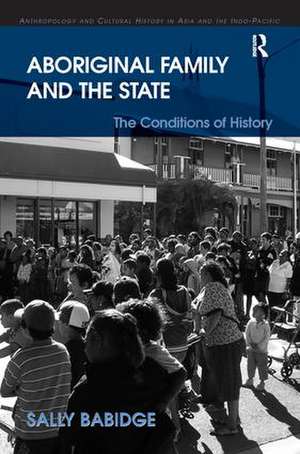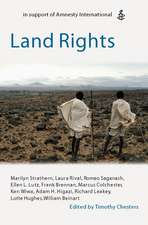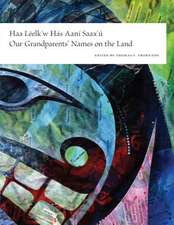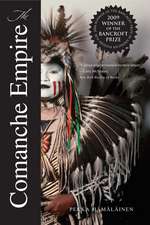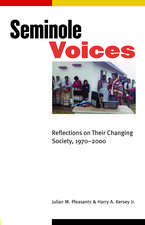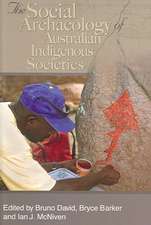Aboriginal Family and the State: The Conditions of History: Anthropology and Cultural History in Asia and the Indo-Pacific
Autor Sally Babidgeen Limba Engleză Paperback – 16 noi 2016
| Toate formatele și edițiile | Preț | Express |
|---|---|---|
| Paperback (1) | 469.34 lei 6-8 săpt. | |
| Taylor & Francis – 16 noi 2016 | 469.34 lei 6-8 săpt. | |
| Hardback (1) | 1000.27 lei 6-8 săpt. | |
| Taylor & Francis – 6 ian 2010 | 1000.27 lei 6-8 săpt. |
Din seria Anthropology and Cultural History in Asia and the Indo-Pacific
- 31%
 Preț: 766.42 lei
Preț: 766.42 lei - 28%
 Preț: 739.39 lei
Preț: 739.39 lei -
 Preț: 476.86 lei
Preț: 476.86 lei -
 Preț: 387.58 lei
Preț: 387.58 lei - 28%
 Preț: 820.73 lei
Preț: 820.73 lei -
 Preț: 389.38 lei
Preț: 389.38 lei -
 Preț: 356.44 lei
Preț: 356.44 lei - 5%
 Preț: 335.37 lei
Preț: 335.37 lei -
 Preț: 469.34 lei
Preț: 469.34 lei - 28%
 Preț: 821.13 lei
Preț: 821.13 lei -
 Preț: 430.00 lei
Preț: 430.00 lei -
 Preț: 383.33 lei
Preț: 383.33 lei -
 Preț: 384.86 lei
Preț: 384.86 lei -
 Preț: 356.44 lei
Preț: 356.44 lei -
 Preț: 387.75 lei
Preț: 387.75 lei -
 Preț: 389.66 lei
Preț: 389.66 lei -
 Preț: 348.83 lei
Preț: 348.83 lei
Preț: 469.34 lei
Nou
Puncte Express: 704
Preț estimativ în valută:
89.81€ • 97.86$ • 75.68£
89.81€ • 97.86$ • 75.68£
Carte tipărită la comandă
Livrare economică 23 aprilie-07 mai
Preluare comenzi: 021 569.72.76
Specificații
ISBN-13: 9781138278608
ISBN-10: 1138278602
Pagini: 292
Dimensiuni: 156 x 234 x 16 mm
Greutate: 0.45 kg
Ediția:1
Editura: Taylor & Francis
Colecția Routledge
Seria Anthropology and Cultural History in Asia and the Indo-Pacific
Locul publicării:Oxford, United Kingdom
ISBN-10: 1138278602
Pagini: 292
Dimensiuni: 156 x 234 x 16 mm
Greutate: 0.45 kg
Ediția:1
Editura: Taylor & Francis
Colecția Routledge
Seria Anthropology and Cultural History in Asia and the Indo-Pacific
Locul publicării:Oxford, United Kingdom
Cuprins
Contents: Preface: kinship, process and history, Andrew Strathern and Pamela J. Stewart: Fieldwork, fishing and funerals; Knowledge and control, violence and protection; Under the Act; Family affairs: relations and relatedness; Home, family, polity; Meetings: social practice and the construction of identity; Elders and 'old people'; The sociality of death and funerals; Aboriginal family and the Australian state; Appendix; References; Index
Recenzii
’It is rare to find an account of Aboriginal experience through time that integrates regional history, indigenous family life, and a critical treatment of the state so convincingly. This study of contemporary indigenous lives is striking both for its intimate accounts of belonging and for its decisive analysis of Australian race relations. The book is beautifully written and draws the reader in.’ Diane Austin-Broos, University of Sydney, Australia 'Babidge makes a substantial contribution to an important body of Australian ethnographic scholarship that interrogates the operation of state power in relation to Indigenous communities and histories... An intelligent, thought-provoking and analytical study, Aboriginal Family and the State will be useful not only for anthropologists and other academic scholars. It should also be read by all who engage with native title issues, as Babidge's insights in this regard are particularly pertinent and meaningful.' Anthropological Forum ’Babidge’s insight is to see those occasions in which both state and Aboriginal cultural formations equally elicit their own forms of recognition out of engagement with each other. In sum, this is a richly detailed and astutely analysed piece of research into the current forms of Aboriginal cultural and social action in rural Australia.’ Journal of the Royal Anthropological Institute
Notă biografică
Sally Babidge is a Lecturer in Anthropology at The University of Queensland, Australia.
Descriere
Aboriginal Family and the State examines the contemporary relations and history of Indigenous families in Australia, specifically referencing issues of government control and recent official recognition of Aboriginal ’traditional owners’. With a rich discussion of the production, practice and inscription of social relations, this volume examines everyday expressions of ’family’, and events such as meetings and funerals, demonstrating that kinship is formed and reformed through a complicated social practice of competing demands on identity.
